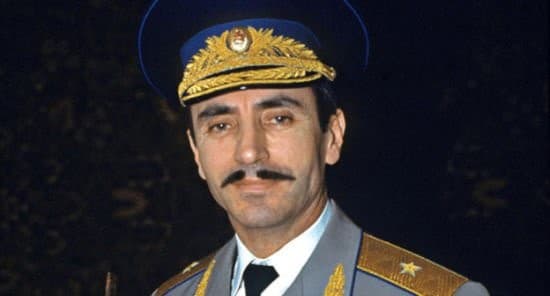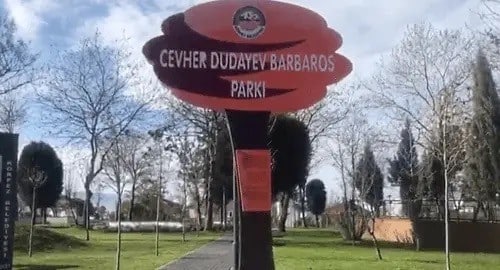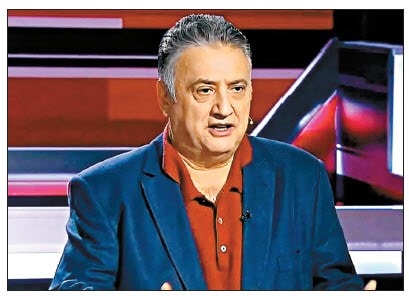Russia's relations with Turkey under President Recep Tayip Erdogan have been chequered. A new irritant crept in recently when a park was named after Dzokhar Dudayev. Dudayev, a former Soviet General, who had left the army after he refused to suppress pro-independence demonstrations in what was then the Soviet Republic of Estonia was elected president of Chechnya-Ingushetia [meaning the Chechen-Ingush Autonomous Soviet Socialist Republic] in 1991, after which he declared the independence of the republic. He was killed by Russian missile attack near Grozny in 1996. Chechnya briefly enjoyed independence, but that independence was lost in the Second Chechen war of 1999. Russia managed with the help of a Chechen militia headed by the Kadyrov family to snuff out resistance. This accounts for the sensitivity of both the Russian government and to the boss of Chechnya Ramzan Kadyrov to commemorations of Dudayev, who represented the fight for independence against Russia.

Dzhokar Dudayev (Source: Quora.com)
Kadyrov and his loyalists attacked the Turkish action and threatened retaliation in kind by honoring Erdogan's political opponents. Russian officials made their displeasure known to Ankara and defended Kadyrov's outburst against Erdogan as explicable. Russian experts played down the importance of the Turkish action and doubted that Turkey was fully endorsing Chechen separatism and speculated on the reasons behind the Turkish action.
MEMRI's survey of the incident follows below:

The park that stoked the controversy (Source: Kavkaz-uzel.eu)
Kadyrov: A Direct Threat To Turkish-Russian Relations
Ramzan Kadyrov, the president of Chechnya assailed the Turkish action as a direct threat to Turkish-Russian relations. He wrote:
"Friends, I have been approached by representatives of the parliament of the Chechen Republic, law enforcement bodies and clergy with a request to respond to the Turkish authorities' actions, which backed the terrorists, who have committed crimes in Russia and actually poured mud on the country's and the [Chechen] Republic's leadership in the Internet.
"They [the terrorists] feel so comfortable in Turkey that in their cynical, repugnant and provocative anti-Russian speeches they do not shy away from vulgarities against defenseless women.
"Can you imagine that Russia would officially shelter an entire organized gang that, let's say, committed a terrorist attack in Turkey and killed the president? And after that this gang started to send threats and insults to the victim's spouse, family members, and to the entire nation from the territory of a friendly state?
"I, personally, cannot even imagine such a cynical political act and therefore I openly address the President of Turkey, Recep Tayyip Erdogan, decide! Either you [Turkey] acquire the status of a state that publicly supports terrorists, or you advocate transparent and honest relations with Russia, without changing your convictions behind its back.
"Otherwise, as long as wanted bandits and lowlifes find shelter in Turkey, as long as they openly hold rallies and events on renaming parks after terrorists involved in the deaths of thousands of peaceful civilians, we insist on the right to retaliate.
"For instance, in such a case it would be a quite logical and politically reciprocal response to commemorate in Grozny the name of the Kurdistan Workers' Party's founder, Abdullah Öcalan, who is serving a life sentence in one of the Turkish prisons.
"I also appeal to the Russian Ministry of Foreign Affairs, as the current actions of the Turkish authorities pose a direct threat to Russian-Turkish relations, which have been developing for centuries. And attention should be paid to this fact, and pre-emptive diplomatic measures should be taken against such manifestations."[1]
Kadyrov got his wish at least partially. Moscow did issue a protest to Ankara over the naming of the park after Dzhokhar Dudayev. Kremlin press secretary Dmitry Peskov informed journalists:
"We have already notified our Turkish colleagues via diplomatic channels that we, to put it mildly, do not approve of such names in Turkish cities." he said.
Peskov defended Ramzan Kadyrov's irate reaction to this event as quite explicable. "This is a very emotional yet explicable reaction by the head of a Russian region that has weathered several wars, that were provoked, initiated by terrorists who attempted to take control over that Russian region." Peskov identified Dudayev as one of those terrorists.
SUPPORT OUR WORK

"Recently, unfortunately, in one of Turkey’s regions one of the parks was named after this terrorist. Of course, this is a very painful decision for all Chechens, for the Republic of Chechnya within the Russian Federation." [2]
Not surprisingly, the Spiritual Board of Chechnya's Muslims (DUM) that takes its marching orders from Kadyrov passed a resolution condemning the Turkish action as a policy that runs counter to building normal relations with Russia.
The DUM accused Turkey of providing asylum to many Dudayev supporters "who killed Muslims or were ready to commit this heinous deed."
Following Kadyrov's lead the DUM resolution threatened Turkish President Recep Tayip Erdogan that the Chechen leadership would reconsider its attitude towards Erdogan's main political opponents. "For example, the famous political figure Muhammed Fethullah Gulen can be perceived by us as a true patriot of the Turkish people, while Abdullah Öcalan - as a prisoner of conscience." [3]
Maria Zakharova, the foreign ministry spokesperson weighed in as well: "Such attempts [to perpetuate the memory of the terrorist Dudayev] are unacceptable and require, of course, the most resolute condemnation by the entire international community...They directly contradict the spirit of Russian-Turkish relations, including mutually beneficial cooperation."
Zakharova recalled that Dudayev was responsible for the "deaths of thousands of Russian citizens" of various nationalities and religious views. Therefore, Russia hopes that Turkey will consider Russia's signals "about the inadmissibility of such steps that undermine mutual trust."[4]
Bagdasarov: Destroy Erdogan Government
But the fallout continued even after Peskov and Zakharova had criticized Ankara. Semyon Bagdasarov, director of the Center for the Study of the Middle East and Central Asia, appeared on the staunchly pro-Putin program "Sunday Evening with Vladimir Solovyov" with the modest suggestion of destroying the Turkish government, that he claimed was a threat in the even of hostilities with Ukraine.
"We must make it clear that we are ready to launch some mechanisms to destroy this government," Bagdasarov said.
The timing was propitious, given Turkey's acute currency crisis and plummeting support for Erdogan. He addressed the issue of the park. "Now Turkey has once again slipped us a skunk, having opened the Dzhokhar Dudayev park in one of the provinces."
Kadyrov's proposal of erecting a monument to Abdullah Ocalan, in Grozny, didn't go far enough. The monument should be erected in Moscow and invitations should be dispatched the leadership of the PKK and, first of all, its commander-in-chief, "a great lover of the USSR and Russia."[5]
 |
|
Semyon Bagdasarov (Source: Kp.ru)
Not A Game Changer
When the furor erupted Gazeta.ru media convened a panel of experts to discuss the matter of relations between the Chechen diaspora in Turkey and the Turkish government as manifested in the naming of the park. It was noted that this diaspora has roots dating back to Czarist Russia when Chechens fled to Turkey following the Russo-Turkish War of 1877. Their number was augmented by another massive wave of Chechens, who fled to Turkey in the 1990s due to the horrendous living conditions following the USSR's collapse and the two Chechen wars.
In addition to the historical foothold of the Chechen diaspora in Turkey, the Chechen separatists like sundry Muslim figures take advantage of Turkey's convenient geographical location, argues Akhmet Yarlikapov, Senior Research Fellow at the Center for Caucasus and Regional Security at MGIMO university.
"It is unlikely that Turkey is purposefully sheltering separatists. It's a transit country for all sorts of Muslim figures. There are not only [Chechen] militants there, but other Islamists as well. It's hard to cope with such volumes of migration. One has to keep in mind the transit role of Turkey." Yarlikapov also noted that some Chechen opposition figures perceive Turkey as a beachead for an eventual return to Russia, because they receive support from the general Caucasian diaspora there.
"There are many former muhajirs (Muslims who left their countries in order to preserve their faith). There are many migrants from the CIS member-states in Turkey, their number is estimated at 50-60 thousand people. Turkey has a set of characteristics that facilitate it's use as a transit hub and a foothold," concluded the expert.
Amur Hajiyev of the Russian Academy of Sciences' Institute of Oriental Studies, the Turkish authorities are benevolent to Chechen separatists partially due to the concept of Pan-Turkism.
"Since the late 1990s, Turkey has followed Pan-Turkic ideas in its foreign policy. Within the framework of these ideas, Chechnya and even Dagestan are part of the so-called 'Turkic world.'"
According to Hajiyev, the Chechen diaspora lives in a time warp:"There are still people among them who mentally do not understand the changes that occurred in the Chechen Republic. In their minds Chechnya still lives in the 90s, i.e. there is war, destruction, criminality and terrorism.".
Yuri Mavashev, Director of the Center for the Study of New Turkey, claims that part of the problem is that Russia has failed to develop a coordinated policy towards the problem of Chechen separatists in Turkey. Mavashev claims that Turkey, while using its security services to supervise anti-Russian sentiments treats the Chechen diaspora like any voting bloc:
"As to the reason for supporting the separatists, it lies in the fact that for the Turkish authorities, they are part of the electorate. Accordingly, the opening of such parks, awards points to the ruling party."
Amur Hajiyev believes that to speak of official support for Chechen separatists is an overstatement.
"Turkey doesn't considers the [Chechen] militants as refugees. There are political groups and movements that think so. Also, it shouldn't be argued that Turkey doesn't officially perceive Ramzan Kadyrov as the legitimate leader of the Chechen Republic, because this is a purely Russian internal issue. At the official level Turkey won't interfere.".
Impact on Russo-Turkish relations
The general consensus was that the Chechen diaspora would be a mild irritant but not a game changer in Russo-Turkish relations. Mavashev explained Turkish policy as a refusal "to put all their eggs in one basket...They know that not everyone supports Kadyrov, and they want to take advantage of that."
Regarding the reaction of the Chechen leadership, they have to decide for themselves whether they are ready to perceive such Turkish policy as normal in the future, or whether they will designate red lines," stressed Mavashev.
Yarlikapov concluded:"There is no doubt that the two countries' relationship doesn't depend on this factor. But the separatists' issue can be used ad hoc and worsen international ties if Ankara does something else against Moscow. However, there is some cooperation with the Turkish special services regarding this issue."
Hajiyev believes that the separatists' issue and the opening of a park in honor of Dudayev may resurface at a joint meeting of the foreign ministries. However, he is sanguine that the problem will not become a "stumbling block" in relations between the two countries.[6]




